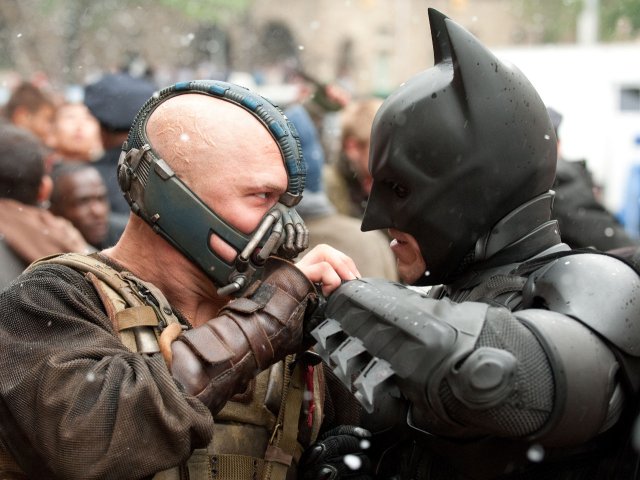
The Dark Knight Rises
Directed by Christopher Nolan
Starring Christian Bale, Tom Hardy, Anne Hathaway
In cinemas now
The Dark Knight Rises, the last in the trilogy of Batman films by director Christopher Nolan, may well become a favourite for many of those who despise, fear or distrust the working class.
Unlike the previous films in the trilogy, Batman Begins and The Dark Knight, The Dark Knight Rises explicitly alludes to real-life politics, particularly the global financial crisis and the anti-capitalist protests that arose from it.
Unfortunately, the analogy is not kind to those who seek to challenge the system rigged in favour of the richest 1%.
Given some of the film’s content, it will be tempting for some to write it off as conservative propaganda. It suggests a lot that conservatives would agree with.
But a closer look reveals the hallmarks of cynical liberalism ― which criticises the system and society’s rulers, but has an inability to imagine any positive alternative. It is also hostile towards those who advocate radical change and holds contempt for working people.
Perhaps unintentionally, the film highlights points where, despite their differences, liberalism and reactionary conservatism converge.
The film begins with a crippled Bruce Wayne (Christian Bale) living as a recluse in his mansion after being retired from duty as Batman for eight years. This is a consequence of events in The Dark Knight, where Batman took the blame for the killing spree of the late district attorney, Harvey Dent (Aaron Eckhart).
Dent has since been canonised as a hero in the fight against crime and his legacy has been used to create harsh new laws. This has allowed Gotham City to become “peaceful”, according to members of elite society.
However, Batman is forced to return to stop Bane (Tom Hardy), a mercenary who terrorises the city and presents himself as “Gotham’s reckoning”.
Add to the mix Selina Kyle (Anne Hathaway), a thief with a rough past who becomes entangled with Wayne when she targets the Wayne Manor. It is mainly through her that the film unloads its criticism of the rich.
“There's a storm coming,” Kyle tells Wayne. “You and your friends better batten down the hatches, 'cause when it hits, you're all going to wonder how you ever thought you could live so large and leave so little for the rest of us.”
But the most memorable line belongs to Bane when he violently raids the Gotham stock exchange, which strongly resembles the New York stock exchange on Wall Street. A trader tells Bane: “This is a stock exchange. There’s no money you can steal.” To which Bane replies: “Really? Then why are you people here?”
Viewers are expected to agree with such verbal jibes, but not when someone takes action to alter this system.
Despite the acknowledged failings of the elite, the alternative is portrayed as much worse. It is hard to take the portrayal of Bane and his followers as anything other than a malicious swipe at the Occupy movement and others who seek to challenge the status quo.
Bane and his followers are a nightmare vision of the working class with power. It is known from the start that Bane is not interested in helping the people of Gotham, but he uses the rhetoric of class warfare and promises “liberation” for ordinary people.
Bane himself is a representation of ruling-class fears. He is a hulking figure with an inhuman voice and scary-looking mask that covers his disfigurement.
He is the embodiment of brute power combined with sinister intelligence and, in one scene, describes himself as a “necessary evil”. As a self-proclaimed leader of the “oppressed”, he is ugly, frightening and vicious.
Bane’s followers are fanatics who do not think for themselves. They come from the dregs of society, live in sewers and look unkempt. Despite Bane’s rhetoric, no ordinary citizens are shown joining his group ― it is for those who are already fanatics or criminals.
It is hard to imagine a more contemptuous analogy for progressive activists.
Bane represents a force that wants to bring an end to the current order, a terrifying prospect for conservatives (who wish the system to remain the same) and liberals (who cannot imagine a positive alternative).
The Dark Knight Rises also shows the lack of viable solutions on offer from defenders of the system. No character is able to question the basis of Gotham’s crime problems. The reliance of Batman and others on symbolic gestures to hold order together proves unsustainable.
The only option offered for salvation is the classic liberal solution: faith in enlightened elites to make good decisions and do good deeds.
The film draws a line between good and bad billionaires, suggesting philanthropy and ethical investment are key to improving society. The issue of wealth disparity is acknowledged, but it is excused on the basis of good character.
And, of course, faith in enlightened elites is personified in the most enlightened elite in Gotham ― Batman ― who must save society yet again.
Putting politics aside, as a piece of entertainment The Dark Knight Rises fails to reach the heights of its predecessor, The Dark Knight. The early parts are enjoyable as an action-drama, but the closing third falters as the plot weakens, making for an unsatisfying experience.

Comments
Anonymous replied on Permalink
Anonymous replied on Permalink
Anonymous replied on Permalink
Anonymous replied on Permalink
Anonymous replied on Permalink
Anonymous replied on Permalink
Anonymous replied on Permalink
Anonymous replied on Permalink
Anonymous replied on Permalink
Anonymous replied on Permalink